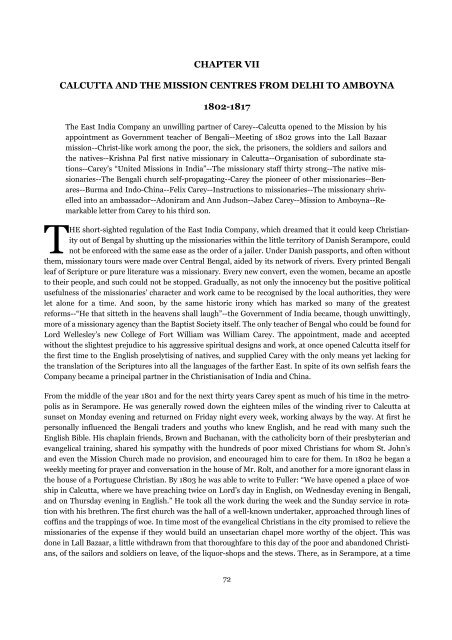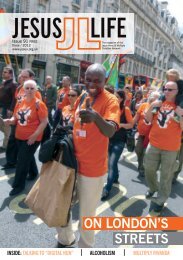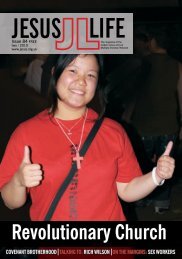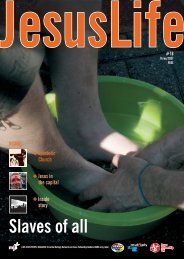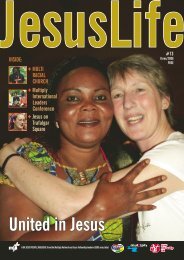Life of William Carey by George Smith - The Jesus Army
Life of William Carey by George Smith - The Jesus Army
Life of William Carey by George Smith - The Jesus Army
Create successful ePaper yourself
Turn your PDF publications into a flip-book with our unique Google optimized e-Paper software.
CHAPTER VII<br />
CALCUTTA AND THE MISSION CENTRES FROM DELHI TO AMBOYNA<br />
1802-1817<br />
<strong>The</strong> East India Company an unwilling partner <strong>of</strong> <strong>Carey</strong>--Calcutta opened to the Mission <strong>by</strong> his<br />
appointment as Government teacher <strong>of</strong> Bengali--Meeting <strong>of</strong> 1802 grows into the Lall Bazaar<br />
mission--Christ-like work among the poor, the sick, the prisoners, the soldiers and sailors and<br />
the natives--Krishna Pal first native missionary in Calcutta--Organisation <strong>of</strong> subordinate stations--<strong>Carey</strong>’s<br />
“United Missions in India”--<strong>The</strong> missionary staff thirty strong--<strong>The</strong> native missionaries--<strong>The</strong><br />
Bengali church self-propagating--<strong>Carey</strong> the pioneer <strong>of</strong> other missionaries--Benares--Burma<br />
and Indo-China--Felix <strong>Carey</strong>--Instructions to missionaries--<strong>The</strong> missionary shrivelled<br />
into an ambassador--Adoniram and Ann Judson--Jabez <strong>Carey</strong>--Mission to Amboyna--Remarkable<br />
letter from <strong>Carey</strong> to his third son.<br />
THE short-sighted regulation <strong>of</strong> the East India Company, which dreamed that it could keep Christianity<br />
out <strong>of</strong> Bengal <strong>by</strong> shutting up the missionaries within the little territory <strong>of</strong> Danish Serampore, could<br />
not be enforced with the same ease as the order <strong>of</strong> a jailer. Under Danish passports, and <strong>of</strong>ten without<br />
them, missionary tours were made over Central Bengal, aided <strong>by</strong> its network <strong>of</strong> rivers. Every printed Bengali<br />
leaf <strong>of</strong> Scripture or pure literature was a missionary. Every new convert, even the women, became an apostle<br />
to their people, and such could not be stopped. Gradually, as not only the innocency but the positive political<br />
usefulness <strong>of</strong> the missionaries’ character and work came to be recognised <strong>by</strong> the local authorities, they were<br />
let alone for a time. And soon, <strong>by</strong> the same historic irony which has marked so many <strong>of</strong> the greatest<br />
reforms--“He that sitteth in the heavens shall laugh”--the Government <strong>of</strong> India became, though unwittingly,<br />
more <strong>of</strong> a missionary agency than the Baptist Society itself. <strong>The</strong> only teacher <strong>of</strong> Bengal who could be found for<br />
Lord Wellesley’s new College <strong>of</strong> Fort <strong>William</strong> was <strong>William</strong> <strong>Carey</strong>. <strong>The</strong> appointment, made and accepted<br />
without the slightest prejudice to his aggressive spiritual designs and work, at once opened Calcutta itself for<br />
the first time to the English proselytising <strong>of</strong> natives, and supplied <strong>Carey</strong> with the only means yet lacking for<br />
the translation <strong>of</strong> the Scriptures into all the languages <strong>of</strong> the farther East. In spite <strong>of</strong> its own selfish fears the<br />
Company became a principal partner in the Christianisation <strong>of</strong> India and China.<br />
From the middle <strong>of</strong> the year 1801 and for the next thirty years <strong>Carey</strong> spent as much <strong>of</strong> his time in the metropolis<br />
as in Serampore. He was generally rowed down the eighteen miles <strong>of</strong> the winding river to Calcutta at<br />
sunset on Monday evening and returned on Friday night every week, working always <strong>by</strong> the way. At first he<br />
personally influenced the Bengali traders and youths who knew English, and he read with many such the<br />
English Bible. His chaplain friends, Brown and Buchanan, with the catholicity born <strong>of</strong> their pres<strong>by</strong>terian and<br />
evangelical training, shared his sympathy with the hundreds <strong>of</strong> poor mixed Christians for whom St. John’s<br />
and even the Mission Church made no provision, and encouraged him to care for them. In 1802 he began a<br />
weekly meeting for prayer and conversation in the house <strong>of</strong> Mr. Rolt, and another for a more ignorant class in<br />
the house <strong>of</strong> a Portuguese Christian. By 1803 he was able to write to Fuller: “We have opened a place <strong>of</strong> worship<br />
in Calcutta, where we have preaching twice on Lord’s day in English, on Wednesday evening in Bengali,<br />
and on Thursday evening in English.” He took all the work during the week and the Sunday service in rotation<br />
with his brethren. <strong>The</strong> first church was the hall <strong>of</strong> a well-known undertaker, approached through lines <strong>of</strong><br />
c<strong>of</strong>fins and the trappings <strong>of</strong> woe. In time most <strong>of</strong> the evangelical Christians in the city promised to relieve the<br />
missionaries <strong>of</strong> the expense if they would build an unsectarian chapel more worthy <strong>of</strong> the object. This was<br />
done in Lall Bazaar, a little withdrawn from that thoroughfare to this day <strong>of</strong> the poor and abandoned Christians,<br />
<strong>of</strong> the sailors and soldiers on leave, <strong>of</strong> the liquor-shops and the stews. <strong>The</strong>re, as in Serampore, at a time<br />
72


